|
2/14/2023 I Don’t Belong Here: Your Friendly Neighborhood ADHD-er Talks Suicidal Ideation and SurvivalRead NowTrigger warning: suicide attempt. Belonging is such an innate human desire that we often forget what a large impact it has on our overall mental health and wellbeing. Newborns need acceptance from their parents/caregivers, children and young adults seek acceptance from peer groups, and adults seek acceptance through partnerships, both romantic and platonic, because it makes us feel connected and fulfilled, bringing purpose to our time on earth. So, what happens when belonging seems to belong to everyone but you? WITH UNDIAGNOSED ADHD AND SUSPECTED AUTISM, I NEVER FELT I BELONGED ANYWHEREWith almost 8 billion people in the world, it seems like it would not be that hard for everyone to find a sense of belonging somewhere with relative ease. I can tell you that was not the case for me, and if you are neurodiverse maybe it was not the case for you either. I spent the first 33 years of my life with undiagnosed ADHD and suspected autism. As far back as I can remember I have been “weird”. Other than with my twin sister – who is my forever best friend and the one human on earth who understands and accepts me completely – I have never felt like I belonged anywhere. Always a bit of an outsider, I never held onto friends for very long and have never been in a relationship for longer than 2 and 1/2 years. To say that I struggled in academic, social, and professional settings for over three decades of existence would be a gross understatement. My neurodiversity dictates how I perceive and interact with the world around me but for most of my life I had no idea I was neurodiverse so most of my energy was spent on trying to force myself to function like my neurotypical peers. After all, that’s the ideal, right? Societal, social, and professional norms are built on the premise that we all “should” think, behave, and communicate in a similar (i.e., neurotypical) fashion. NO ONE UNDERSTOOD ME. NOT EVEN ME.When you fall outside of that very small and limiting box of expectations, your reality may be very lonely. I could never quite grasp why it seemed so easy for others to make and keep friends, to move in and out of relationships, to know just what to say and how to act so that people wanted to be around you. I tried so hard to fake it and be like everyone else, but the real me always came out and it always meant losing friends and partners because they didn’t understand me. I didn’t even understand me. I knew there was something different and I spent a very long time trying to find out what that was. For as long as I can remember, I have been searching for answers about why I was, well, me. I have been in and out of therapy since I was 8 years old, sitting in front of licensed clinical therapists, psychologists, psychiatrists, primary care physicians, teachers, and really anyone who would listen, trying to find myself. Because I knew I was not like everyone else but could not figure out how to “fix” myself, I suffered from profound anxiety and depression with suicidal ideation developing in my teenage years. I was misdiagnosed multiple times and put on so many medications for anxiety and depression with nothing really working, which only added to my despair. UNDULATING BETWEEN F**K THE WORLD ATTITUDE AND CHILD-LIKE DESPERATION FOR ACCEPTANCE AND LOVEThe root of my challenges came from my neurodiversity and because that had not been identified, nothing improved. As a result, I undulated between hyper independence with a f**k the world attitude and child-like desperation for acceptance and love. Without an understanding of the why behind my feelings, perceptions, and behaviors, I spent my youth adrift in dangerous waters. In an effort to cope with my very loud brain and my incredibly deep emotions, I turned to alcohol, tobacco, occasional marijuana, and toxic relationships. Not only did these things give me a pseudo escape from a reality where I did not belong and did not know why, it gave me an excuse to lean into the rough edges of myself. After all: “Everyone gets rowdy when they drink so it won’t seem weird that I’m loud and hyper and over the top.” “Smoking will show everyone that I am damaged and tough. Besides, what do I care if it hurts me?” “Weed helps my brain take a break from the never-ending stream of consciousness pulling me in 10 different directions at once.” “Love is supposed to be chaotic. Screaming at each other and getting into fights is a show of passion. I have to process my strong emotions somehow and toxic relationships give me an outlet to do that with the false sense of security that comes with being with someone, even if they’re wrong for me.” MY DOWNWARD SPIRAL DOWN INTO DARKNESS AND SUICIDE ATTEMPTSShocking no one, these tactics only furthered my downward spiral. The first time I tried to take my life I was 19 years old, just a few weeks shy of finishing my freshman year in college. I had gone through a bad breakup from my first serious relationship. The breakup was a result of a mistake I made, coupled with my unhealthy coping mechanisms and general lack of knowledge about my brain wiring, I descended into a very dark place. Research shows us that those with ADHD are more likely to use alcohol, tobacco, and illicit substances and have a greater risk of developing a substance use disorder than those without ADHD. Never in my life had this statistic fit me more accurately than during this time. I was drinking to excess back then and engaging in dangerous habits like reckless driving and other thrill-seeking activities. None of these things made me feel better and no matter how hard I tried to fit in and find that sense of belonging, I still felt deeply alone. One night sitting in my dorm room, it all became too much and I made the decision to end my life. I texted all of my “friends” to say I loved them and took an entire bottle of pills with a liter of vodka. One of the people I texted was suspicious of my wording in the message and found me on the floor when she came to my room to check up on me. She called for help, and I was taken to the ER, and given charcoal to neutralize and expel the poison in my stomach. I spent a night in the telemetry unit to make sure my heart was not damaged, evaluated by a psychiatrist, and sent home with my mom and sister, who had driven almost 6 hours to get to me when they received the news. At first I felt like a failure and the feeling of “I don’t belong here” and wanting to end all the pain did not recede immediately. Most days it was a fight to find a reason to stay, but I kept fighting. As time passed, the reasons to stay became more and more powerful. The journey hasn’t been easy, but it has absolutely been worth it. INTERPLAY BETWEEN MY EXPERIENCES AND MY NEURODIVERSE MINDI did not know it at the time, but my experiences are directly reflective of the neurodiverse mind. I have an extremely hyperactive brain, so I talk a lot. I also have a tendency to be impulsive, and constantly struggle with executive functioning like task initiation and working memory challenges. I always seek out dopamine and get bored easily when there is not enough novelty or excitement. I am plagued by rejection sensitivity dysphoria and ruminating negative thoughts, and have difficulty maintaining healthy relationships with romantic partners, finances, food, and physical activity. Despite fitting the picture of a combined-type ADHDer perfectly, I did not receive an accurate diagnosis until I sought one out myself after my young nephew was diagnosed. At that time, I also dove into researching neurodiversity and was blown away by how much I related to the experiences of those with ADHD and autism. I found a local professional who diagnoses adults and made an appointment with her for assessment and on-going care management. CORRECT DIAGNOSIS ENABLES ME TO LOVE ALL THE PARTS OF ME I TRIED TO EXTINGUISH FOR SO LONGThe diagnosis changed my life because I was finally able to put a name and a frame around my experiences. It helped me to stop feeling broken and start feeling unique in a powerful and profound way. It has allowed me to find answers and explanations for so many of the things that made me hate myself. I can now lean into my strengths and find ways to love all of the parts of me that I have tried to hide or extinguish for so long. Having undiagnosed ADHD and suspected autism meant that I walked through so much of my life trying to force myself to be anyone other than me. Wearing a mask every day and feeling like the real me would never be good enough was depressing and defeating. The lack of belonging led me to a point where I attempted to take my own life. Thankfully, I was not successful. “Failing” at that has allowed me to flourish in my purpose of creating a sense of belonging for so many others who have spent their lives feeling alone. For me, life changed when I stopped trying to be everyone else and figured out how to work towards being the best version of me. Next time you feel like you don’t belong here, make sure you are seeking belonging in your “here” and not someone else’s. GUEST AuthorOur heartfelt gratitude to our guest author this week, Gwendolyn Janssen MHA, MSN, RN, for courageously sharing her story with such vulnerability and bravery. In the words of California's former Surgeon General, Devika Bhushan, who thrives with a bipolar diagnosis, "stigma festers in the darkness and scatters in the light." By sharing our stories, we humanize our struggles, removing bricks from the wall of stigma and letting light shine through. Those struggling step out from the shame and silence and reach out for help; and, are empowered to come into their own surrounded by their inner lights, self worth and self love. We all deserve to be seen, heard and valued. Thank you for this reminder Gwen. You will always belong. Shine on mighty warrior, shine on.
6 Comments
Despite the abundance of dating opportunities, finding love has never been more challenging. We’ve come so far with technology and cultural progress, yet we still struggle with dating burnout. Finding love should be simple now, but it’s become a complex and emotionally draining journey. We strive for security, independence, and growth in our relationships, yet the search for love seems to bring on feelings of anxiety, insecurity, and heartache. We want to protect ourselves, but it’s becoming harder. Dating World ChangeD But Our Humanity Remains the SameThe feelings of unworthiness and shame individuals with mental health challenges experience when dating are often overlooked. Asking for an emotional connection right away can feel like an imposition, and waiting too long can leave us with doubts. Despite the turmoil, we still have to play the game and losing sucks. We hide our feelings, put on a facade, and are afraid to show our vulnerabilities. We seek validation and send panicked screenshots to our friends for the next best reply. We’re constantly second-guessing and navigating with care, yet we dare. But sometimes, in the quest for love, we shove our emotions to the back of our minds, choosing solitude over relationships and self-discovery over love, believing that we must love ourselves before we can love others. Navigating My Highs and Lows In Pursuit of LoveI have struggled with my moods for a long time, especially in what some would say are my “hot years.” I’ve woken up on many days with the vow of not pursuing relationships altogether, feeling unworthy and overwhelmed. On other days, I would feel ambivalent, deleting dating apps and re-downloading them frequently, exhausting my very little energy. I would be hot and cold, asking for space one moment and as little space as possible the next. If I really liked someone, I’d freak out. What if they could see through me? Sometimes, I would reveal too much too soon, and I always wondered, why was that a problem? I have searched for stories like mine in books, TV shows, movies, and other people, hoping to find a way to make it to the other side. But to avoid heartache, save energy, and keep other aspects of my life stable, I have denied myself the opportunity to date on several occasions. I’ve also been in failing relationships where the guys would gaslight me, twisting my words and actions to make me question my own reality. And when I dared to speak up, they would blame it on my bipolar disorder, making me feel like the villain. They would use my mental health as a tool to manipulate and control me, making me doubt myself and my own experiences. It was a constant battle, trying to navigate the confusion and uncertainty they created. I felt like I couldn’t trust my own mind and that I was constantly walking on eggshells, trying to avoid their wrath. My condition felt like a burden, and I thought I must be wrong after all. It was cruel and left me feeling isolated and alone. “Take Me As I Am, Whoever I Am”I had to learn that my bipolar disorder is not something to be exploited or used against me and to trust my own mind. I had to learn to dig deeper into my intuition and virtues, always align my actions to my moral compass and walk away when needed. This guided me in all types of connections I made over these years. I have slowly started speaking up about my mental health. Among friends, coworkers, and at open mics because pretending that I was not crumbling on the inside was getting exhausting. A friend once suggested the third episode of the show “Modern Love,” in which Anne Hathaway plays a character who navigates the dating world while struggling with bipolar disorder and balancing her professional life. That hit me hard. I must have cried throughout the episode. The title “Take Me As I Am, Whoever I Am” is not just for the world but also something I have had to ask myself to do. I feel my feelings very deeply. Lately I’ve had to dig a lot deeper to uncover what I am running away from, discover what keeps me from moving forward, and how I can avoid this back-and-forth in my decisions and actions. These promises of self-protection would keep me isolated and spare others from hurt, but they also burnt bridges and left some perplexed. What followed eventually was regret. With goals achieved, self-care maxed out, and passions no longer filling the void, this dust would settle, leaving me alone with my desperation staring back at me. But I do often catch a break which gives me a chance to breathe as a human — a messy, vulnerable, magnificent human who is very well capable of love. LET LOVE FLOW BY EMBRACING YOUR VULNERABILITIES AND INSECURITIES AND PASS YOUR LOVE ON TO OUR CHILDRENThis is not just a story about seeking love in romantic relationships but about preserving the very essence of it. A story about love that:
As I delved deeper into my emotions, I discovered a hidden treasure — a superpower I never knew existed. Embracing the ebbs and flows of my moods made me incredibly attuned to the feelings of others, and empathy began to flow naturally from me. I recall a moment when I was feeling particularly low and witnessed a woman crying on the subway, ignored by all around her. Without a second thought, I followed her off the train and gave her a comforting long hug until she said she felt better, and was ready to go on with her day. It was then that I realized the true power of empathy and how it can transform the lives of those around us as well as ourselves. It makes us brave to show up. It’s also about learning to receive empathy as well. My friends who understand my condition show me endless grace and compassion when I feel unworthy and when my thoughts become stuck in a cycle. Let’s pass this love on and assure children who’ve endured the bitter pain of growing up in an emotionally abusive environment, where love was a distant dream, that it was never their fault. They have every right to feel the hurt and the pain. Indeed, allowing themselves to do so is the truest form of love. There are those among us – coworkers, friends, and even strangers – who will listen without judgment and hold you tight as you cry. That is love. And, when your friends are too burdened to reach out, you must reach out to them with tenacity and openness and, when they finally open up, that is love. We all seek love in our romantic relationships, but we can’t limit it to that. It flows freely. Love is everywhere, in every person we come across, and in every moment. We have all felt denied of the love we so deeply crave, but let that be the driving force to create more of it. We are love; we are it. Do not take my word for it. Go out into nature, sit in a garden and truly relax. Take in every detail around you, and you will see it. You will feel it. DO NOT LET YOUR MENTAL HEALTH LIMIT YOUR ABILITY TO LOVETo those battling their mental health, please hear this: your capacity for love is not limited by your struggles. It is often through the darkest of days that we learn to love with the deepest of sincerity. You have felt the pain of life’s harsh realities, and in that pain, you have found the strength to love with a ferocity that others can only dream of. You understand the importance of compassion and empathy: of truly seeing and understanding another person. You have been to the depths of despair and have emerged with a heart full of love and the courage to give it to the world. You are capable of loving in ways that others can not imagine; your love is pure. It is real and it is what the world needs. You are the light in the darkness, the hope in the despair, and the love in pain. Believe in yourself, in your capacity to love, and let that love be the beacon that guides you through life’s journey. I always knew I was different. A little too sensitive, a little too anxious, a little too much. As a child, I struggled with social anxiety and an obsessive need to please others. And, although I appeared to be a very happy child, something was starting to change in me. As a teenager I began to struggle with suicidal thoughts but was too afraid to tell anyone. I had been placed in therapy, but I was too scared to tell my therapist just how sad I was for fear of what would happen to me. my facade crumbles and my mental health along with itI once heard Jim Carey say that “depression” means “deep rest” and that a depressed mind is your body’s way of saying, “I need a break, I don’t want to play this character anymore.” That is exactly how I felt. I was physically and emotionally exhausted from trying to be happy all the time, trying to please others, and wearing a mask so that no one could see the real me and how much I was hurting. By the time I reached college, the façade that I had been holding up for so long came crumbling down and I had a full mental breakdown. I was forced to drop out of school and was eventually placed into McLean hospital as my behaviors became increasingly dangerous. I felt like I had failed everyone in my life and had failed myself. I no longer saw a bright future. I didn’t care anymore about anything, especially myself. Borderline personality disorder, anxiety, and depression diagnoses help me make sense of myself and my lifeI was hospitalized at 19 years of age and diagnosed with borderline personality disorder, anxiety and depression. Once I came to understand my diagnoses, the distorted way that I thought started to all make sense. I finally understood why I was such a people pleaser, why I was so terrified of being abandoned by my loved ones, why I was so afraid of anger, and why I had reached my breaking point. I started to realize that these illnesses had dictated so much of my thought processes that I didn’t even really know who I was. I lived in such paralyzing fear for most of my life, afraid to upset people and afraid to fail. I was exhausted. BEGINNING REAL WORK OF UNDERSTANDING WHERE MY ILLNESSES END AND I BEGinBut now the real work has begun: learning to understand where the illnesses end and where Dina begins. After spending ten years in and out of hospitals and rehab facilities, I was able to slowly reintegrate into mainstream society. I was able to go back to community college and then finish my Bachelor’s degree at Boston College while I worked a full-time job. The more I learned about myself, the more I began to realize just how smart I was, how kind I was, and what a great laugh I had. FULLY EMBRACING MY LIFE’S DREAMS, I Go for itWith a lot of grit and hard work, I was able to finally pursue the career path that I always envisioned for myself, landing internships and eventually a full time position working in television. I have achieved things that many thought were not possible for me and, even now, I need to constantly remind myself to be grateful for that. However, as we age and mature sometimes our dreams change and now, I am beginning to envision a whole new career path as a mental health empowerment keynote speaker. And once again, I plan to achieve that because I know that I can. my journey to recovery is a medal of honorI used to want to sweep the fact that I had endured a life-altering mental illness under the rug and just move on. I was ashamed and embarrassed of my past but now, I realize that I should NOT be ashamed of this. Rather, I should wear my journey to recovery like a medal of honor. I should be proud, and I should remind myself of that every day. A mental illness that alters your life never truly goes away but rather it lies dormant and reappears when life gets tough. I often try to control all aspects of my life because I have somehow convinced myself that if I can control life then it can’t throw me off the tracks. It can’t derail me and make me sick again. But that is not how life works. my light is A Beacon Reminding me We ARE All Perfectly ImperfectI am still learning to let go of the reins every once in a while, embracing the knowledge that even if life breaks me, I won’t stay broken forever. I am still actively in therapy and on a daily medication regimen. I fully support this because it allows me to lead a “normal” life. I still have issues that I struggle with daily, and I continue to work on myself every single day. Do I wish I was not an anxious person? Yes, of course! Do I wish I had not lost ten years of my life? Absolutely! But am I proud of the person I became? Undoubtedly! please heed my advice to youI once heard a quote, “when you go into the storm, you don’t come out the same person … you aren’t supposed to.” Mental illness is a storm but, like the quote says, you can come out of a storm, you just aren’t the same person who went into it. You are stronger and more resilient. My advice to you is this: don’t allow your mental illness to dictate what you are capable of. Only you can determine that. And remember, you are not flawed. You are not unlovable. You are not unworthy. You are perfectly imperfect. Go chase your dreams. You got this!
Why are FAMILIES and mental health advocates of loved ones WITH SERIOUS BRAIN DISORDERS fighting so hard FOR RECLASSIFICATION?Recently, the term Serious Brain Disorder (SBD) has been circulating in my Facebook mental health advocacy groups more and more. At first, it seemed as if these circles of advocates wanted the insurance companies to code Serious Mental Illnesses (SMIs) differently so they would issue better compensation to psychiatric providers and so patients could have easier access to treatment. In that case, I thought, why not address it with how the insurance companies are required to code them? But it starts elsewhere, beyond the insurance companies. As I explored and researched the issue, it became clear that taking Serious Mental Illnesses seriously must include labeling it transparently and as unbiased as possible. Here are several reasons why families and mental health advocates of loved ones with Serious Mental Illness—especially schizophrenia and the like—are fighting with all their hearts, souls, and minds to have it recognized as what it truly is: Serious Brain Disorder. First, What is SMI?The Diagnostic and Statistical Manual of Mental Illnesses defines Serious Mental Illness as “a small subset of the 300 mental illnesses that are in DSM.” “According to the National Institute of Mental Health, serious mental illness is relatively rare, affecting only 5% of the population over 18. Serious mental illness includes schizophrenia; the subset of major depression called ‘severe, major depression’; the subset of bipolar disorder classified as ‘severe’ and a few other disorders.”(4) One of the sources I interviewed pointed out that the general public doesn’t know what Serious Mental Illness is so reclassification would clarify the concept. On the other hand, I pointed out, wouldn’t that muddy the water? Not if they are educated. SBD EffortsAn organization advocating for the reclassification of SMI to SBD is the National Shattering Silence Coalition (NSSC). The nonprofit has eight points of unity members align under, and the first is their primary concern:
The Two Were Once OneThe two disciplines—neurology and psychiatry—are not as different as one may think. In fact, at one point they were one discipline. Historically, psychiatry and psychology were a part of neuropsychiatry until “psychiatrists enthusiastically embraced the key that they were given to the human psyche, and this new ‘mentalistic’ approach consequently detached psychiatry from neurology,” this article in neuro.psychiatryonline.org explains. “It may be further speculated that neurologists, too, accepted this dichotomy and were relieved to leave the treatment of mental illness to others.”(1) A Broken System Slighted and MisunderstoodMental health and the demand for psychotherapy and psychiatry are coming into the forefront on matters related to COVID-19’s mental toll on peoples’ psyches. However, advocates for SBD have been begging for practical solutions to a broken mental healthcare system long before the present worldwide crisis. Jeanne Allen Gore, SBD advocate, co-founder, and Coordinator of NSSC, argues that mental healthcare as an industry has been misconstrued, underfunded, and at a large disadvantage from neurology and pathology sciences and healthcare systems. Gore points out, “If you do the math, there is a glaring mismatch: $36.55 spent on adults with SBD compared to $478 on those with Alzheimer’s, which is 13 times, or 1,327% more per person.” According to Gore, other brain disorders like Alzheimer’s and autism have been inclined to more empathetic responses from the public. Since Alzheimer’s and autism have been funded and fought for their position at the table of medical sciences to be recognized as structural, biological, and medical brain disorders, it appears they garner more compassionate attitudes and legitimized views from society. The Science Has Been ThereIn the article at neuro.psychiatryonline.org, authors Shahar Arzy, M.D., Ph.D., and Shlomo Danziger, M.A. explain, “With our current scientific understanding of the cerebral basis of psychiatric disorders, the era of the computational, data, and genomic revolutions once again merges the domains of neurology and psychiatry for a neuroscientific-based diagnosis, monitoring, and treatment of neuropsychiatric diseases.”(1) In regards to SBDs like schizophrenia and symptoms like psychosis, science and technology are making ways to merge the disciplines of neurology and psychiatry. Especially in disorders like schizophrenia, severe depression, and severe bipolar disorder where psychosis is a symptom, these are brain-based and medical in nature. “More recent and dramatic evidence has come largely through functional magnetic resonance imaging and positron emission tomography,” per Mary G Baker, President, European Parkinson’s Disease Association as stated in Baker, Kale, and Menken.(2) Mary Palafox, RN, Chair of the Schizophrenia and Psychosis Action Alliance (S&PAA) states, “It’s not a debate whether schizophrenia is a neurological illness. Science has already determined schizophrenia to be a neuro-developmental disorder.” You can visit their website over the next few months and follow how S&PAA is actively changing the treatment paradigm for those with schizophrenia spectrum disorders. A Legal Loophole and Political ProblemsYet in practical solutions to psychosis in schizophrenia, psychiatrists cannot treat psychosis if the patient is not voluntarily admitted or concedes to treatment by their own will. In any other discipline, in a state of psychosis as a result of a medical condition, the doctors must treat, and their hands aren’t tied by laws. The danger of the legalities with SMIs or SBDs is what happens to many with SBD like schizophrenia when untreated, known as “dying with their rights on.” Jeanne Allen Gore writes: “People with neurological illnesses, under medical standards of care, have access to resources and supportive care that those diagnosed with a ‘mental illness’ do not have access to. Their doctor makes the decisions about what level of care is needed and when it’s needed, not a judge. For decades, the decision to admit a patient with SBD for medical care has been made based on laws requiring dangerousness and the availability of hospital beds, or should I say, lack thereof, rather than medical necessity.” She emphasizes, “This unconscionably cruel system has resulted in horrific abuses, neglect, and suffering. Our loved ones end up homeless, incarcerated, or dead far too soon. Science has proven these are no-fault, neurological brain disorders. Clinicians, doctors, and scientists know this. They are not a failure to control one’s behavior, a character weakness, or the result of a traumatic childhood.” Behavioral and mental health sciences have their value in psychosocial rehabilitation for substance use. Psychotherapy continues to be a respected and evidence-based approach for those with cognitive damage and disorders from substance use, trauma, and brain injury. The value of psychology and psychiatry cannot be ignored and compartmentalized, and there is a place for all these studies to effectively work together to help patients and those who care for them. It won’t be achieved as effectively and as successfully if true severe, serious mental illness, is not taken seriously in and of itself. To do that, action must be taken to move psychiatry and neurology back into a working relationship. The advances in science are here and there is enough evidence to show the validity of a medical cause of schizophrenia and these types of severe illnesses. The Bottom LineThe battle to have SMI recognized as SBDs continues, in order to be funded for more research to find better treatments and more physical tests connecting the symptomology of psychosis to the etiology (causes) of biological and physical structures. When the standard world health organizations take serious brain disorders seriously, then doors can open to more changes and better care. Then insurance payers can code them “medical” and doctors in hospitals and ERs will have to treat them as any other medical condition: with integrity, compassion, and ethics. Advocates for SBDs are pleading for this shift in terminology and semantics because of the severity of the illnesses and the brokenness of the system that currently treats those with them. With language that articulates that these disorders are brain-based and physical, reclassifying SMI to be recognized through medical standards can lead to better care and more practical solutions for individuals who suffer from it. This will level the playing field for equity in research and treatment funding, awareness campaigns, and give access to care and programs like #HousingThatHeals, just as Alzheimer’s and autism have achieved. With every discovery we make to understand mental illness, we will all inevitably have to face the reality that “mental” is medical. Reclassifying Serious Mental Illnesses as Serious Brain Disorders is the gateway to the broader acceptance of that reality. references
addendum from Kerry Martin, CEo & FounderAn added benefit of reclassification is removing the word "mental" from our narrative which would erode stigma in our society — in our workplaces, schools, social media, etc — saving lives and lessening suffering for our children, youth and adults struggling with their mental health. Stigma is trapping far too many behind its wall in silence and in shame, keeping those in need from reaching out for help. And, for those who believe we have made great strides in eradicating stigma, I would ask you, why hasn't our own Congress repealed a blatantly discriminatory law that has been on the books for almost 60 years, the IMD Exclusion, that has resulted in marginalizing our most vulnerable citizens, incarcerating them in our jails and prisons, walking over them on our cold streets, and pushing them into early graves?
12/15/2021 EMPATHY AND KINDNESS IN our WORKPLACEs priceless: WHAT WORKING WITH STIGMA FREE LEADERSHIP LOOKS LIKE when you have undiagnosed major depression, anxiety, add and an eating disorderRead NowWe have an advocacy campaign running to eliminate stigma in the workplace and create cultures based on kindness and empathy, and have published a number of blog posts speaking directly to our team's lived experience with workplace stigma and the negative impact it has on their lives (such as being fired after CEO finds out our India Chair has bipolar disorder and a suicide attempt after our US Chair is laid off whilst in throes of major depressive episode.) This is a different story however - one based on working in a stigma-free environment with my lived experience, mental (read physical) illness and an eating disorder. What I was up against: undiagnosed inattentive ADD, social anxiety, major depression, and an eating disorderI was working for a large building corporation that had umbrella companies such as telecommunications and facilities management. While I had a direct manager, I also had the Chief Operations Officer who managed me (and the entire company). At the time I was living with undiagnosed inattentive ADD, generalised and social anxiety and major depression. I was also living with an eating disorder for which I needed intense treatment. While I was seeing a psychiatrist during this time, he diagnosed me with depression. That was all. Little did I know the depression was slightly more than just your everyday depression. Major depression sucks but it would take another five years before I was formally diagnosed with this. My bosses put my wellbeing first when I seek treatment for my eating disorder even thou pain in the ass for my co-workers.After working in the Business Centre of this company I got a promotion and moved into the Telecommunications office. It was an all male office except for me. I was the only female. At first I was my normal self - quiet because I was anxious and trying to find my feet in this different part of the company. Once I felt comfortable and opened up, the boys I worked with became more like brothers than coworkers. We had a lot of fun and laughter. It was during this time that I needed to seek treatment for an eating disorder. This involved missing every Friday morning and having a two-hour lunch break once a week so I could go to a shopping centre and have lunch there with my therapist as my biggest phobia was eating in front of people. This is where the stigma free workplace and management comes into things. Not only did my boss in the telecommunications department support me during this time, but the Chief Operations Officer did too as he had to approve it all. I know it was a pain in the ass for my coworkers but I needed to do this for myself. You have no idea how grateful I was to have the manager I had in telecommunications and the Chief Operations Officer be so supportive of what I had to do. when you google "cats in tights" due to your inattentive add and anxiety, thing start to fall apart. Yet, I was Supported by management once again.I was working with undiagnosed mental illnesses at the time but what really impacted me on a daily basis was my inattentive ADD and anxiety. In a meeting with my COO, he said my performance was like a rollercoaster, that went up then went down again, then up then down. I couldn’t focus on the task at hand and know I would have been the employee they knew I could be if I had been diagnosed and medicated for ADD. My COO took hits for me as well - my performance came into question with the Directors and upper management. I know that he guarded me and shielded me from being fired or disciplined for my work performance. I tried so hard during my time in the telecommunications department, but when you can’t focus and end up googling cats in tights due to your inattentiveness, things start to fall apart. I was moved to the facilities management division probably in the hope my work performance would improve. after making alcohol my best friend, I let that friendship end and elected to resign. But through all this, they never gave up on me.My work did not improve. I was so anxious all the time. Almost every day my friend and I went to the pub at lunchtime so I could have a beer to calm myself down. Alcohol became my best friend during this time because it masked all my emotions and I didn’t need to think about my underlying anxieties. While most people would be fired for this, the company knew something wasn’t right with me. Every Christmas party I would get hideously drunk and black out, not being able to remember the night before. We had an amazing team of people at this building corporation and when I drank I embarrassed every single person I worked with. Sure, I laugh about certain things now, but the reason for my drinking was to hide my mental and emotional pain. I ended up handing in my resignation from the company after five and a half years to pursue real estate, as my family were moving back to Perth and I wanted to stay living in Melbourne. Creating a stigma-free workplace isn't rocket science. If i didn't get the support I did from leadership, I don't know where I would be today.Creating a stigma free workplace isn’t rocket science or hard. This company did it for me so willingly and never ever questioned what I needed to do. They were there to support me and they went above and beyond to do this. There were no questions asked. It was just what I told them I needed to do and they were amazingly understanding. I think on the day I resigned everyone breathed a sigh of relief. I couldn’t continue working there the way I was. They perhaps knew it before I did. But I realized I needed to pause and seek more intensive treatment. I still have relationships with a lot of people from the company today, 15 years later, including my boss in telecommunications and the COO. They now all know about my mental illnesses as I have been very vocal about it, and they are just as they were at work - totally understanding and supportive. They are just all around great people. To rid your workplace of stigma, you just need acceptance. That is all anyone wants. If the shy, anxiety riddled kid starts working below their capacity, ask them if they are okay. If the severely depressed person takes more days off than allowed, ask them how you can help. When people go to management and advise them of their mental illnesses ask how you can make it so that it won’t impact their job. Keep things on a level playing field. I will forever be grateful to my company I worked for and the way they handled me, my mental illnesses (albeit undiagnosed), and my work ethic and behaviour. They could so easily have wiped the slate clean, said this is too much and have somebody else replace me. But they didn’t. They kept their belief in me. I don’t know how or why, but they did. But what I do know beyond a shadow of a doubt is, if they didn’t help me through those hard times with my eating disorder, I don’t know where I would be today. Empathy and kindness go a long way. And, they both cost nothing. My bosses and colleagues giving me the feeling that I was worthy and that I belonged despite my issues was invaluable to me and my mental wellbeing. Really, when you give it a think, aren't we all worthy? Worthy of empathy and kindness? AuthorErin Macauley, Chief Hope Officer, Accelerating Social Good, and Australia Chair, We Are All Worthy, a cause-advocacy campaign to co-create stigma free workplaces on foundation of empathy with needed mental health programs and supports for all. 12/15/2021 Challenges Those with Bipolar Diagnosis Confront in Workplaces: Don't Let Anyone Tell You This Is Not the Right Job for YouRead Nowperhaps this isn't the right job for youI have been told that, “perhaps this isn't the right job for you.” Don't let anyone tell you that. And if they do, do not believe them.
I work well. I am a good employee. Let me give you a small list of jobs that I have done that I have had panic attacks during: waitress, delivery driver, warehouse, janitor, social worker, zookeeper, ride operator, cleaner, canvassing, lab tech, cafeteria worker, retail, student, and mother. That is a wide variety of jobs. If I believed that I could not work somewhere because I was going to have a panic attack, then I would not be working. I work anyway. just because my panic attacks my make some uncomfortable is no reason for me to hide in my house and not work.I have bipolar disorder and it affects all parts of my life. That is something that I am constantly trying to manage. Just because that may make someone else uncomfortable, it is not a reason for me to hide in my house all the time. Some people cannot work and there is no shame in that. I cannot go to any other grocery store than my one grocery store. There is no shame in that. We all have our difficulties and if yours is that you cannot work, I respect that. But, perhaps, maybe you can go food shopping, but you occasionally have a hard time. Should you have to order your food and have it delivered? Of course not. if i had a visible illness, would you tell me not to work? of course not.If I was blind would you tell me I cannot work? Of course not. Why is it okay to tell someone with a mental illness that they cannot do something? I have difficulties, it is true, and sometimes I need a little help. I am not asking for special treatment. I am simply asking to play on the same level field. addendum: why we're launched a global grassroots campaign to create stigma-free workplaces built on a foundation of empathy - by the people for the people - to ensure we all feel worthyRaine not only deserves the same level field, she like anyone else with a serious brain disorder or, anyone else who is in need of mental health support (clinical diagnosis or not), deserves empathy, grace, caring and kindness at the workplace. In too many workplaces however, the field is far from level. We also all deserve to work in stigma-free environments that enable us to flourish and do our best work for our employers and for ourselves so we may feel of the utmost value. So we feel we belong. So we feel worthy. Not a total lack of empathy and caring friends. Because we as human beings always deserve that. Always. Today, our workplaces, more often than not, are not safe places. They are not empathetic, kind or caring. And they are chock-a-block full of stigma. Case in point, the Great Resignation where droves are leaving as they don't feel they are getting the deserved mental health support. Whilst it's easy to build a business case for why companies should bring in proper mental health programs and supports, still far too many have failed to do so. But here, we are presenting the human case (or cost). In light of far too many human cases brought forth by not only mental health advocates but ordinary people trying to survive, we have launched an Accelerating Mental Wellness Campaign asking workplaces to take a pledge to meet our criteria for stigma free environments. We are paying attention and watching on behalf of simply too many who are being treated with a total lack of empathy, grace, caring and kindness. And, on behalf of some who have attempted to take their own lives as a result; and on perhaps behalf of some who have died by suicide. We simply will never know how many as their precious souls are no longer here. For more on our global initiative to put an end to workplaces discriminating against those who are simply suffering and in need of empathy not a lack of support or, in the worst case, who are fired for bravely coming forth with their struggles or for not performing due to depression, please see our Advocacy page. And join us our movement to ensure all people feel worthy regardless of need for mental health support by signing our change.org petition: change.org/weareallworthy. We do hope friends that you will join us, stand up and speak out. This simply has to stop. authorAs part of our social change campaign to co-create stigma-free workplaces built on a foundation of empathy with needed mental health programs and supports, we invite people to share their stories with us to help build the human case. We believe we can humanize stigma with storytelling and educate by sharing what is it feels like to walk through our world with a serious brain disorder. NOTE TO READER. This is a story submission to our Accelerating Mental Wellness Campaign from a stigma fighter. As part of our social change campaign to co-create stigma free workplaces built on a foundation of empathy with needed mental health programs and supports, we invite people to share their stories with us to help build the human case. Please join us in thanking Mehar, who finds within herself the courage to not only share here, but also uploads a selfie to our Wall of Solidarity, taking another brick out of the wall of stigma, signs our We Are All Worthy change.org petition, and shares her reasons why on LinkedIn, asking others to sign too. Mehar, you truly are a stigma-fighter superhero! And, we so love and appreciate you. May your inner light continue to shine on brightly. When manic, it is about wanting to change the entire world and believing I can. I truly live the words “the ones who are crazy enough to think that they can change the world, are the ones who do.” And it is not always a delusion. If I can brace it, channel it and welcome it. I can be just crazy enough. Just a little less crazy than the bad while braver than those who let logic come in the way and play it safe. They say it's in my head and I say yes, you are right, It is! but they don't believe it's true.Would it be truer if your brain was on the outside, I ask? Wouldn’t YOU do everything to protect it …anything that is needed? Why is it on me to teach you when you are the ignorant one? Doctors say “Let’s treat the highs first.” I don’t trust them. I feel exceptionally creative, powerful both physically & mentally. And, oddly spiritual. That to me is the best part. I can read the signs of the universe. But this phase transitions into a paranoia where I think my doctors are conspiring against me, and the entire world is my enemy. It is a constant battle because the highs bring out the best in me but the lows are my enemy. I know they are both liars, and still they are not. Unhealthy high horse of self-righteousness, over-confidence, grandiosity and detachment from reality. The racing, obsessive yet beautiful ideas but that incoherent pressured speech… where they get lost and so does everyone around me. Those profound conversations, my creative hunger! Am I making the best speech? Things I never said before, things I have never ever heard. “So profound” my friends would say, but my poor luck “what, what did I just say?!” lost in a memory fog, I am stuck in the middle of the best version of myself and the worst one.The bickering breaks me down. In my darkest moments, I fear the most, I see my universe collapse, and the signs fade ... no matter how much I stretch my arms. And then the whole sky comes down falling on me. And, for some strange reason, that sky is grey and dark and awfully quiet around me. The tunnel vision, it is surreal. And then, it grasps me in its arms, but it doesn’t want me to know what ‘it’ is. The anxiety feels like a gremlin sitting on my shoulder, whispering lies in my ears every moment of the day. But then the gremlin leaves. I just feel awfully lonely. The memory of my high-self is what keeps me going. I believe in all my dreams, hopes, and thoughts that were racing in my mind, and I pray I will remember them. I know now, from the help of my same therapists, doctors, and the loving community, that this is no illness. This is as humanly as possible I can respond to the miracles and trials of life. there is help. there is hope. But wouldn't it be amazing to seize that just crazy enough moment forever?Heck yeah! Here’s where I start. I sleep! Tired or not, depressed or not, my deep sleep is the place I start. Self-care, boundaries, and rest. I don’t need to earn, they are the natural states I was ripped off of. I don’t call myself manic for my great ideas. I own my brilliance. But I pick them one by one and contain myself with discipline and ask for help when I want. I am beyond those checklists of symptoms and the labels been put on my every action. I speak up, stand up for myself and do the same for everyone. “I carefully listen to the joys and waves of laughter and the cries of those who had been silent for a while as I march on. Those ‘silenced’ will roar one day to their glory, and in their roar, the stigmatic words of hate, judgment, and despise will fade.” I know it’s a swing so come join me, why not! My lows are mine, my highs are too. Going so deep in my life would be impossible, if it weren’t for this Bipolar Disorder we call. What if I am just wired differently, like so many are. My anxiety is my yearning, my depression is my cry for rest, my mania is my higher-self. All this magic is real…as real it could be. And even if it is an illusion, it is a lucky one. P.s. stepping out of my comfort zone into the comedy zone.My biggest inspiration is Tim Ferriss who flipped his bipolar into learning everything he could do. One thing he said that stuck with me: if you want something new don't go after what's already created. Create something YOU need the most. For me, I stepped out of my comfort zone and onto the stage. I stood up and started making jokes about being bipolar. My mother couldn't stop laughing nor could the audience. But this was as much for me as it was for them, if not more so. I hope you enjoy. 12/8/2021 fighting through Hell as a child to emerge an empowered woman: the grit and resilience of a true mental health superhero, Meagan CopelinRead Now[TRIGGER WARNING: SH, SA, R*PE, ED] i have to fight through hell to become the EMPOWERED WOMAN i am today.
BEING BORN WITH GRIT, DETERMINATION AND FIGHT DOESN'T MATTER WHEN YOU'RE BORN TO TEENAGE DRUG ADDICTSAs a young girl, growing up in the city of New Orleans, I was always determined to be the very best and to never give up despite my obstacles. In fact, my aunts and uncles nicknamed me “Maybe Tomorrow” as they saw determination and grit from the moment I was born. My great-grandmother, Anna Copelin, who we called Mother Anna, holds a special place in my heart. Mother Anna passed away when I was 3 years of age, and although I do not remember much about her, I do know she still guides me and watches over me daily. She has truly been my guardian angel. My mom and dad were teenagers when I was born. I was primarily raised the first 3 years of my life by Mother Anna and my great grand-father, Daniel Copelin (Granddaddy Copelin), not because they wanted to but because they needed to. Even born as a premature baby, I had so much fight in me. I was a very small baby, with a big forehead (LOL). My great grandparents were full of love. The greatest memories I shared with Granddaddy Copelin was us sitting at the kitchen table eating stale ginger snaps and cold hot dog links. For some reason, my granddaddy loved giving us grandkids stale snacks. I still smile thinking about how my granddaddy enjoyed a snack that I found very unpleasant, but I still enjoyed spending time with my love. He was the first man that I ever loved, and he showed me love as I didn’t grow up with my dad in my life, so my granddaddy and certain uncles were there for me. My birth mom was in and out of my life and was extremely unstable. I remember when I was around 6 years old, she was involved in an unstable relationship with a man, and he got so mad at her that he hit her in the head with a car jack. She needed over 200 stitches. That was very scary to watch. I really think I started to experience mental health issues around that time or maybe earlier, starting around the age of 5. My dad disappeared when I was around 7 years old. I didn’t remember him and never cared to find him. I did start asking about him later but remembered that the other men in my life made sure I was good. (I am happy. I never had daddy issues thank goodness.) My mom and dad were both crack heads. I mean call it like you see it. They abused drugs heavily. I saw my mom take drugs, snort crack, and sell her body. I was young seeing all of this. WTF. No child should ever have to live through this hell.My mental health was spiraling out of control. I was starting to act out and cut myself. I was a child. Why was I seeing this shit? At the time, I never realized this was a sickness she possessed and for years I did not like her. I hated her. I didn’t want a relationship with her. I even told people she had died. I was angry so anything I said at that time I meant it. She was fucking up my mental health. I was depressed, had PTSD, was wetting the damn bed, experiencing an eating disorder, etc. I was a child. No child should ever have to experience this, no matter what. I WAS MAD at that time. My mom had lots of men in her life, and I mean LOTS of men. She would meet a man on Wednesday, and we would be living with him on Friday. I watched my mom experience lots of pain from men, from being abused to assaulted. She was on drugs and gone for days. There were times I didn’t see my mom for days, even weeks. This was traumatizing for myself as well as my brother and sister. My mental health was spiraling out of control. I was cutting myself and biting my nails down to the skin. I was going through hell. getting held down, raped and pimped out by your mother when eight seriously fucks with your mental healthAt the age of 8 years old, I was raped multiple times by my mom’s boyfriend. I think he was boyfriend number 500 of that year. I loved school and would go right to school after being raped by that ugly old ass monster. He smelled like grease and molded bread. He was a PIMP and would have sex with prostitutes before and after he raped me. My mom was aware of this but when drugs take over your life, that is typically the focus and not anything else around you. He told me not to tell anyone, and he even told me that he would tell her and that she wouldn’t do anything. The nerve. And he was right: I told her and nothing was done. These two were really messing with my PTSD. Severe depression was kicking in. Crack and cocaine are truly a hell of a drug. at age of 12, diagnosed with clinical depression, ptsd, anxiety, eating disorder, ocd, and behavioral and emotional disorder. thanks mom.School was my safe haven and even though I was bullied daily, I still went with dirty ass clothes and cuts on my body. I should have been playing with barbie dolls and eating dinner at the table with a normal family, but I was facing severe trauma at 8 and 9 years old. I eventually moved in with an abusive aunt, who would beat me with a broom and make me sleep in my own urine as I was still wetting the bed from severe trauma. I was suffering and going downhill. After two years or so, I had an opportunity to move with another aunt who changed my life. That aunt saw that I needed help and sent me to see a licensed psychiatrist. At the age of 12, I was diagnosed with clinical depression, PTSD, anxiety, an eating disorder, a behavioral and emotional disorder, and OCD. I was provided a prescription for mental health medication as well. learning to forgive, not for her, but for me.For years, I did not like my mom and didn’t see her again until I was 20 years old. I had to really learn forgiveness and it was hard. I sought counseling and joined a church to help me learn how to forgive my mom. I finally forgave her about 7 years ago. I am now 40. I realized that forgiving her was not about her but about me. And about freeing me. To move on and succeed in life, I had to learn the power of forgiveness. That was truly a process for me. I had to be open and understanding. I had to place myself in her shoes in order to understand her struggles. I didn’t have to have a relationship with her to forgive her. It felt good to rid that baggage that was holding me back for years. The act that hurt me will always be with me as I have that right, but forgiveness has lessened its grip on me. Forgiveness has allowed me to led with understanding in my personal life, as well as show empathy and compassion for my parents, as well as others around me. How can you improve your child's mental health? your child deserves it.One of the best things you can do to keep your child mentally healthy is to take care of your own mental health. As a parent, it is important that you protect your child and never allow them to be placed in situations that may harm them and scar them for life. A child needs to be a child and do things that children do, such as playing with dolls and car toys. Children are innocent.
Parents should also have a basic understanding and answers to questions such as what mental illnesses are, who can get them, what causes them if that is known, how diagnoses are made, and what treatments are available. Do your homework. Your child deserves it. i was put on this earth for a reason. speaking up about stigma is my gift. It is my calling.When I share my story with others, I always say that I am happy I have been through the things I have been through. My reason is because I believe GOD knew I could handle this. I am not my parents and never inherited any of their traits or habits. I was placed on this earth to help young girls and women all over the world share their story. Speaking up regarding the stigma of mental health is my gift. I was meant to do this. If you're thinking about hurting yourself, are worried about a friend or loved one, or would like emotional support, the Lifeline network is available 24/7 at 1-800-273-TALK (8255). AuthorDr. Meagan T. Copelin is the Supporting US Chair of Accelerating Mental Wellness, a social-justice campaign to co-create stigma free workplaces built on a foundation of empathy with needed mental health supports and programs. 12/5/2021 a call for social justice and STigma-Free Workplaces: WE get fired because of our mental illnesses BUT only we deal with STIGMA'S POISONous WRATH AND true depths of ENSUING SUFFERINGRead Nowresilience built up in childhood. check. higher education underway. check. then, a series of weird events started happening.I had a very good childhood with loving parents and friends. I was bullied a little at school. But that gave me some resilience and taught me self dependence at a very early age. I was a straight A student and excelled at my studies. I got my Bachelors and then pursued a Masters in Computer Science from the best college in India. Being an INFJ, I was always a self-starter and figured out solutions to problems myself. Then, a series of weird events started to happen to me. In my last semester of graduate school, other students started noticing a change in my behavior. A calm, introverted kid was now fighting with everyone, verbally, not physically. I was much more irritable and got angry at the slightest of things. I was unaware at that time of exactly what was happening. i soldiered on, landing my first professional job. But, quickly burnout after being expected to work long hours, becoming nonfunctional for months.I started my internship at a game development company in 2014 where I was expected to work long hours. I was not performing at optimal levels and after 6 months, I experienced my first severe burnout. I came home severely depressed. My parents supported me. I was nonfunctional for months. My neighbors started noticing I was not getting out of the house. They did their best to try and talk to me. With that said, being in episodes spoiled my relationships with almost everyone. Yet, still I couldn't really figure out what exactly was happening to me until I had a lightbulb moment. My Lightbulb Moment. I realized I needed treatment to survive. And, I got THAT AND MORE: a bipolar 2 diagnosis and A LITHUM Prescription. check.I was lost in the darkness, struggling to figure out what was wrong with me. Grasping at straws, I went online and started reading and joined online forums. I read the DSM. I did research. I read blogs. That all led me to finally going to see a psychiatrist. After asking me questions during a one-hour consultation, he diagnosed me with Bipolar 2 and put me on Lithium. After three months of Lithium, I got a little stability and decided to give work another go. back to work ONLY TO HAVE my hard-fought stability snatched away. CEO discovers MY bipolar disorder. I'm fired.I got a job as a Junior System Admin two blocks from my house and worked there for almost 2 years. It was a mid-sized company with 150 employees. I had very good relationships with everyone and helped everyone with their computer issues. Then, the CEO finds out about my bipolar disorder and fires me two weeks later. Even to this day, I still get calls from the IT department asking for help with IT problems. I still offer give solutions. I Enter a stigma-free workplace at last. My stability, balance and SENSE OF worthiness RETURN.Then, I got a job at a chain of salons as an IT Manager. It had 3 branches for which I was managing the entire IT and digital marketing. This time, however, my boss was very supportive and helped me in every way to become productive. But due to COVID, he had to shut down two of the branches and laid off people. But he has always stayed in touch, even to this day. "To me stigma-free workplaces are built on foundations of people understanding the need for inclusivity and empathy. My third and current job was found via LinkedIn. I applied to a Denver-based company and the Founder interviewed me for an IT Manager position but gave me the Project Manager position. I got a few episodes during this job but my company supported me when they knew I had bipolar disorder. Medications Taken to date to see me through this journey. Did I have to go through all this? I had seen a severe form of illness but I could manage it and most people couldn't tell (or were not telling me) that I have such a severe condition. I had taken almost every medication over the years, which is generally prescribed for bipolar. I can't help but wonder if my journey would have not been as arduous if not been for stigma in the workplace; and if perhaps I would have found the perfect cocktail for treating my bipolar sooner. You see it is not easy or particularly fun to have to try all these different medications as you cycle up and down and as society pushes us up and down with stigma.
My most irritable symptoms were hand tremors and throbbing headaches. I still have these. How do I COPE? BY FIGHTING BACK. AND BY GIVING BACK TO OUR COMMUNITY.Cancer doesn't just go away, nor does bipolar disorder. You have to find methods in order to survive. I learnt coping mechanisms for my illness at a very early stage. I could tell when my moods were swinging and took immediate action. Other coping mechanisms included:
But, the best coping mechanism for me has been and still is helping people. That naturally lifts your depression. I have been helping people for many many years with their IT stuff and with my mental health advocacy work. LIKE AIR POLLUTION, STIGMA IN OUR WORKPLACES IS POISONING US CAUSING BOTH PHYSICAL AND EMOTIONAL SUFFERING. LIKE A CLASS ACTION LAWSUIT, WE ARE FILING A SOCIAL ACTION LAWSUIT. WE ARE TIRED OF BEING FIRED.Most recently, I have become the Chair in India for Accelerating Social Good's social-justice campaign, Accelerating Mental Wellness, to co-create stigma free workplaces built on a foundation of empathy with needed mental health programs and supports in place. Why? Because it is unjust for people like me to get fired simply because I have bipolar disorder. I see this as analogous to a class action lawsuit in America. Like a social action lawsuit in a way. People are poisoned by stigma. In a class action lawsuit, I understand people are literally poisoned by pollution so they come together and file a lawsuit to get reimbursed for medical bills and for their suffering, the punitive damages. But we are not filing a class action lawsuit. We are not taking this to court. We are taking it to the people. We are taking it to to you. We are asking you to lean in and listen to the human case, our stories. How is this any different for those of us with bipolar or other mental illnesses (read serious brain disorders) who are being fired? Is stigma in the workplace not poisoning us to? Are we not also feeling physical pain? Trust me, having to go on med and after med to try to regain your footing after being fired does cause much physical as well as emotional pain. We too are suffering. Where is our justice? Who is standing up for what is right? Who is advocating for change? I am. Accelerating Social Good is: Founder and CEO and Founder, Kerry Martin, supported by Meagan Copelin, chairing in the United States, COO Erin Macauley chairing in Australia, and Natasha Tracy chairing in Canada. They are leading mental health advocates and they all have lived experience too. They also have their own stigma stories, some harder to read than mine. But it's not just us. There are many others who agree stigma in our workplaces is discriminatory, unjust. And, not just for those with a serious brain disorder such as bipolar but unjust for every single human regardless of your physical or mental health condition, visible or invisible, and regardless of the color of your skin or your sexual preference. It's unjust period. Please visit our Wall of Solidarity, made up of everyday people like you and me. People who have stepped up to join us in our campaign. We call them our stigma-fighter superheroes as by uploading their selfies to our wall they are helping us take another brick out of the wall of stigma and sending a clear message that we want the wall taken down. Finally. These are not just concerned citizens, but global diversity, inclusion and equity leaders, best-selling authors, mental health advocates, podcasters, nonprofit leaders, and those that suffer from mental health conditions. I hope that others will join us in our grassroots campaign to eradicate stigma in our workplaces and put an end to the discrimination. And, to finally provide urgently needed mental health programs and supports in our workplaces for all who are suffering. We are all humans worthy of support, not worthy of being poisoned by stigma. No one should get fired because they have a mental illness. This discriminatory practice must be stopped. AuthorSHitesh Gupta, India Chair, Accelerating Mental Wellness, A Global Workplace Cause-Advocacy Initiative Sponsored by Accelerating Social Good with contributions by Kerry Martin, Chief Purpose Officer and US Chair. 11/23/2021 Mental health stigma could have been difference between Me living Or being yet another mental illness statistic: workplace terminates me and takes away my bipolar lifeline, my health insuranceRead Nowworkplace terminates me and takes away one of my lifelines, my health insurance
Ultimately, I was fortunate. With the support of my friends and family, and drawing upon my own hard work and determination, I was able to improve and become the person I am today. But mental health stigma was another barrier to wellness that could have easily been the difference between me living this life or becoming another mental illness statistic. Don't those of us with bipolar disorder already have to fight hard enough to stay alive corporate america?Next year, over 25,000 Americans will die by suicide. Half of them will have bipolar disorder. How many can be saved is up to us. Up to Corporate America. Up to those workplaces that continue to allow stigma to fester. That continue to fire those with this serious brain disorders because we are too depressed to work. To string two coherent thoughts together. Or, we are too manic and we upset your work-life culture or you work us too hard and force us into manic states. Or, because we are simply misunderstood as people. Yes, we are just like you. People. We, as a society, can come together and eradicate the stigma which is quite simply killing us and putting us in early graves. For far too long, the bipolar community has been ignored. Just but one example, in a post explaining why, A Call for Spending Equality Given Devastating Impact of this Killer Disease by Kerry Martin, our Chief Purpose Officer and Mental Health Activist. It is currently estimated that 4 to 6% of the population has some form of bipolar disorder, with the disease affecting 5.7 million adults, 2.6% of population age 18 and older. According to the National Institute of Mental Health, 83% of these cases are considered severe, with 51% not receiving healthcare treatment. The risk of suicide among those living with bipolar disorder is 20 to 30 times greater than the general population and significantly higher than other depressive disorders. Over their lifetime, 80% battle suicidal ideation and approximately 28% will attempt suicide within five years. Fifty percent of those with bipolar will attempt suicide at some point in their lives, with up to 11% dying by suicide. Some studies indicate that the suicide rate is closer to 20%. addendum: WHY ACCELERATING SOCIAL GOOD LAUNCHED, IN COLLABORATION WITH MENTAL HEALTH ADVOCATES & CONCERNED CITIZENS, A CAMPAIGN TO CREATE STIGMA-FREE WORKPLACESGabe didn't deserve what happened to him but we are so happy here with us now as he is an outstanding mental health advocate and a treasured member of our mental health community. However, he like anyone else with a serious brain disorder or, anyone else who is in need of mental health support (clinical diagnosis or not), deserves empathy, grace, caring and kindness at the workplace. In too many workplaces however, that is simply not the reality. We also all deserve to work in stigma-free environments that enable us to flourish and do our best work for our employers and for ourselves so we may feel of the utmost value. So we feel we belong. So we feel worthy. Not a total lack of empathy and caring friends. Because we as human beings always deserve that. Always. Today, our workplaces, more often than not, are not safe places. They are not empathetic, kind or caring. And they are chock-a-block full of stigma. Case in point, the Great Resignation where droves are leaving as they don't feel they are getting the deserved mental health support. Whilst it's easy to build a business case for why companies should bring in proper mental health programs and supports, still far too many have failed to do so.
AuthorsGabe Howard, Bipolar Speaker & Writer, Host: Inside Mental Health: A Psych Central Podcast, Author, Mental Illness is an Asshole & Kerry Martin, Chief Purpose Officer, Accelerating Social Good & Mental Health Activist Flourishing with a Bipolar Diagnosis |
Details
Archives
February 2023
Categories
All
|
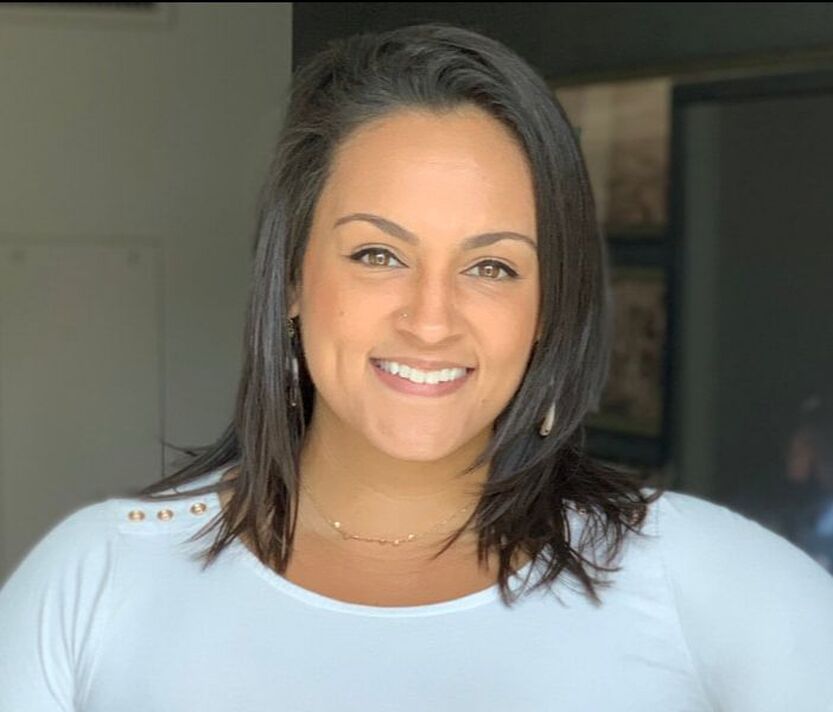


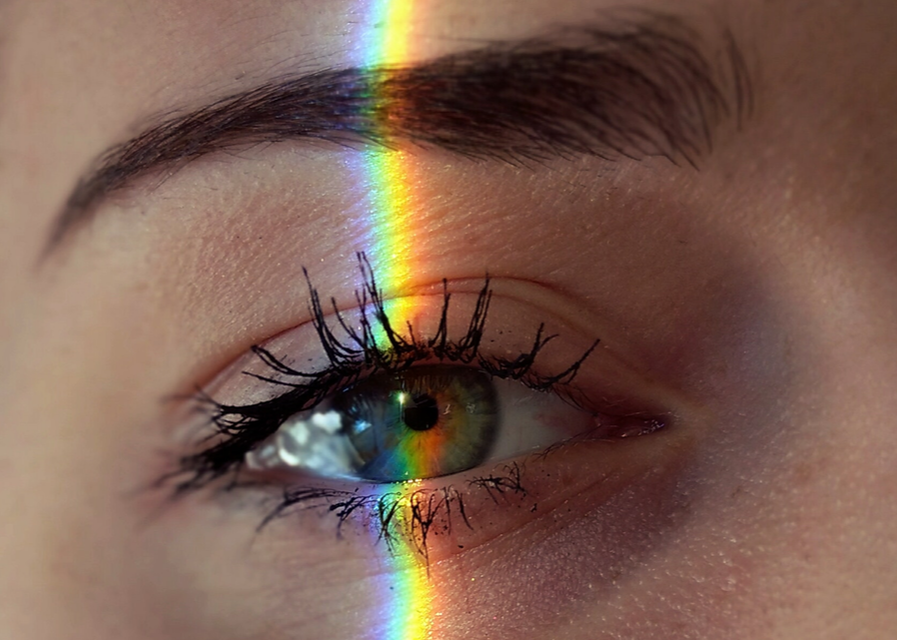
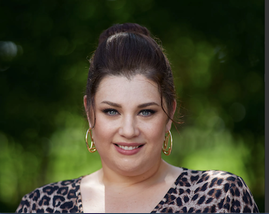
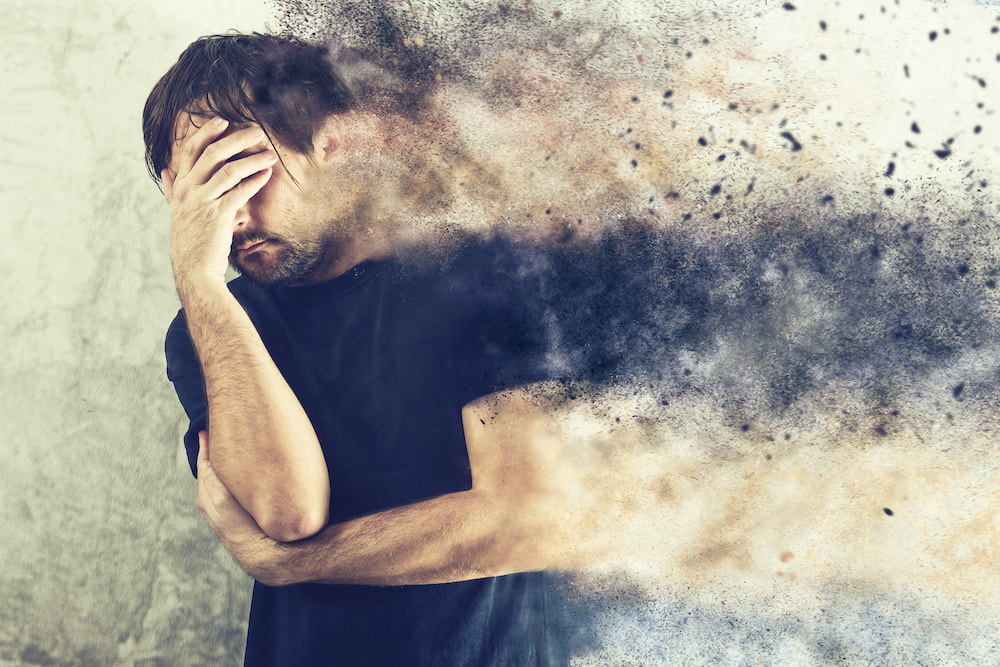


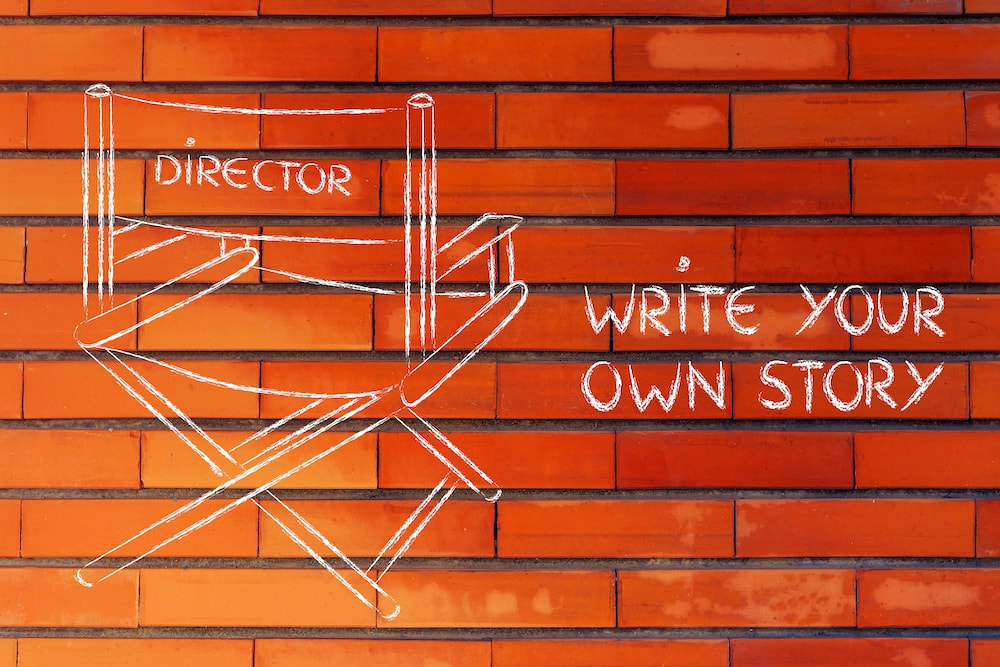
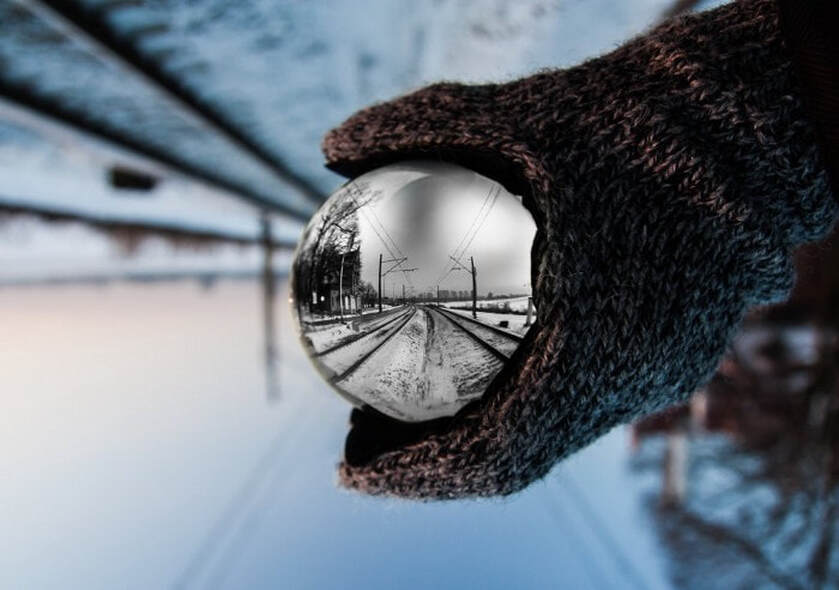



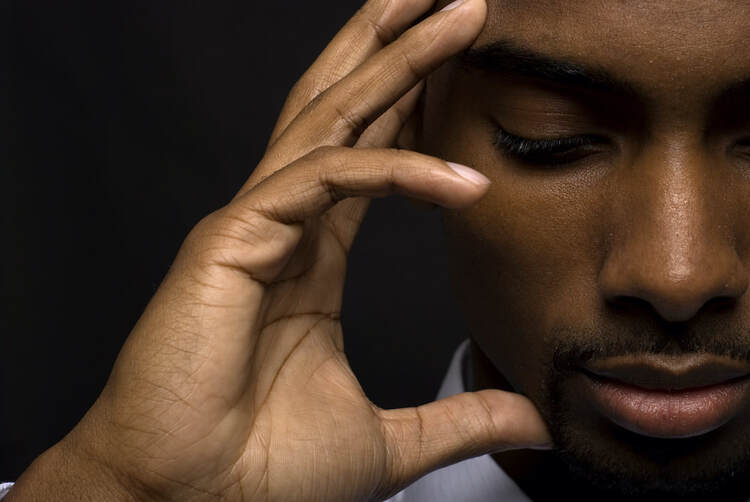

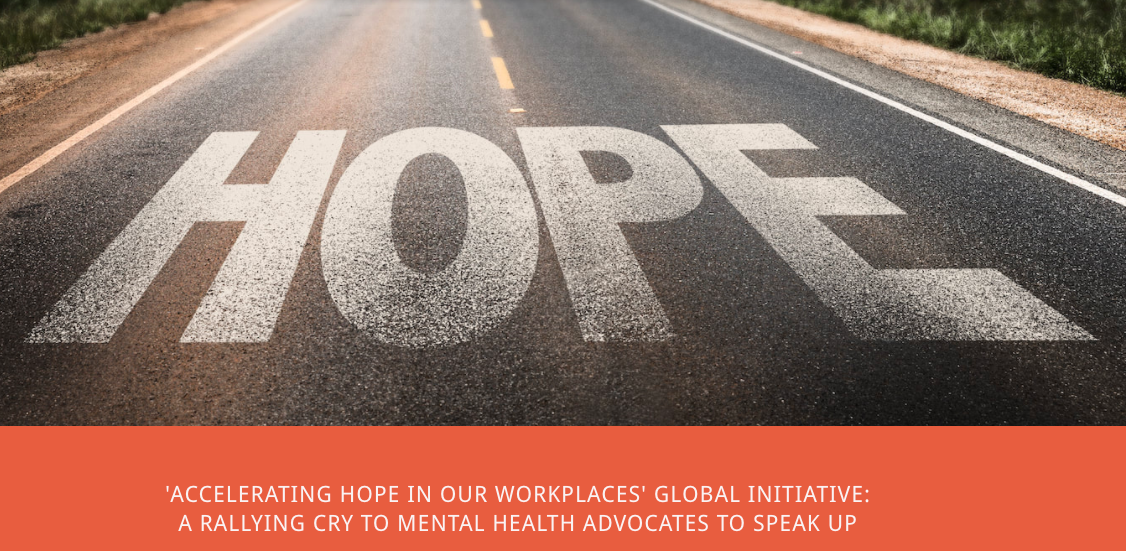

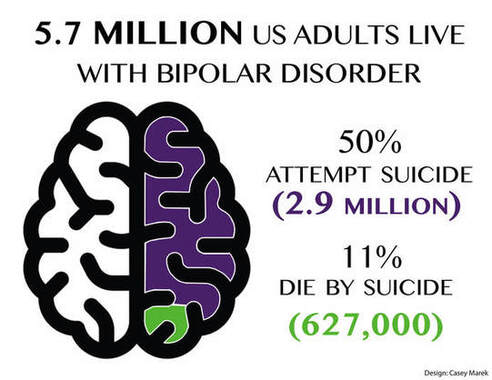
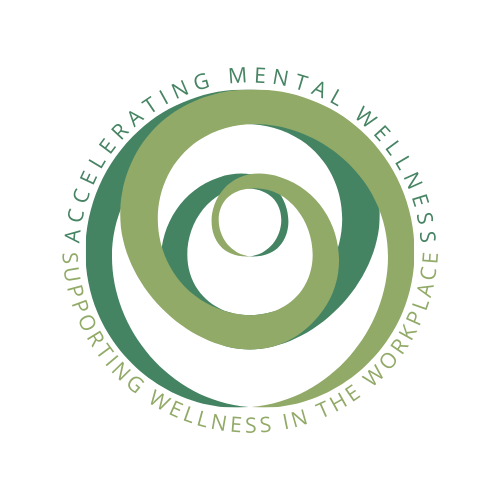
 RSS Feed
RSS Feed